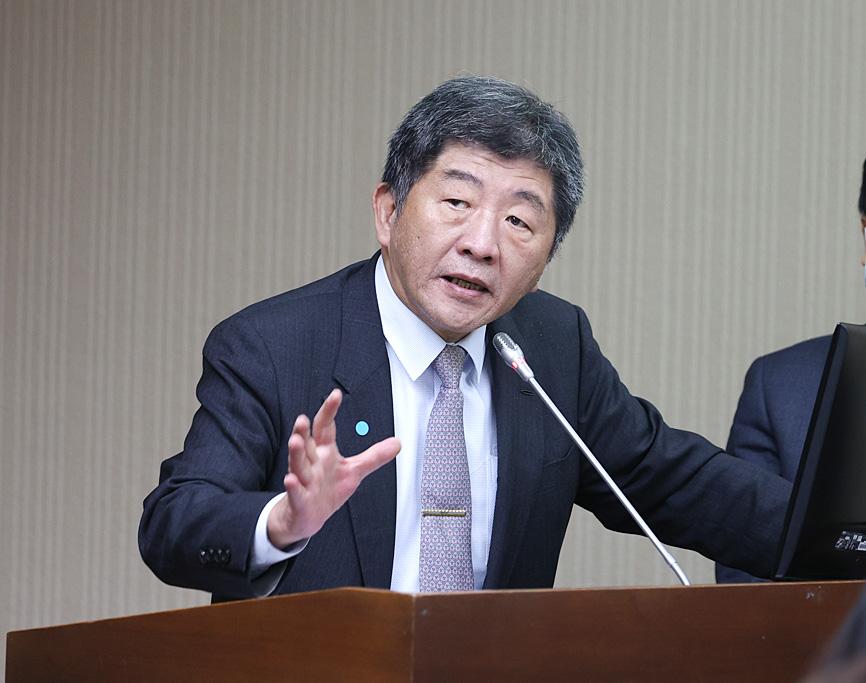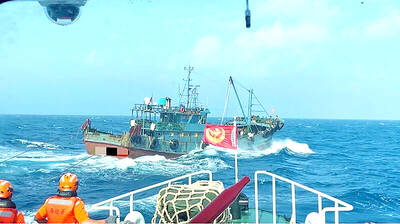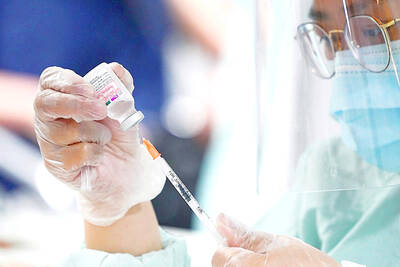Taiwan has secured nearly 15 million COVID-19 vaccine doses, the Central Epidemic Command Center (CECC) said yesterday, as it reported five new imported infections among travelers from Indonesia and the Philippines.
Minister of Health and Welfare Chen Shih-chung (陳時中), who heads the center, said that Taiwan on Monday signed a procurement contract with a COVID-19 vaccine manufacturer and paid a deposit to secure 10 million doses.
It was the first contract finalized with a manufacturer and negotiations are under way with three other vaccine makers, Chen said.

Photo: CNA
With the more than 4.6 million doses that can be obtained through the COVAX platform — a global framework to accelerate the development and manufacture of COVID-19 vaccines and ensure equitable distribution among member countries — Taiwan has secured nearly 15 million doses, he said.
Asked when the doses might be available locally, Chen said that safety and effectiveness are the most important factors, so specialists would first assess the vaccines.
The center can only count on the amount of doses secured and continue to negotiate to receive more doses as soon as possible to meet public demand, he said.
No one can guarantee the timing, as the vaccines are still in clinical trials, he said.
“If anyone could assure us that we could get the shots in the first quarter of next year, we could set off firecrackers to celebrate,” he said.
Meanwhile, five new imported cases of COVID-19 infection have been confirmed, Chen said.
Three Indonesian women, aged 30 to 50, on Nov. 10 entered Taiwan for work, he said.
They arrived without symptoms and stayed at centralized quarantine facilities, he said.
The women were on Monday tested before completing their quarantine, and the results returned positive yesterday, Chen said.
A Filipina in her 20s and a Filipino in his 30s, who entered Taiwan for work on Nov. 10 and Nov. 11 respectively, did not have symptoms when they arrived and stayed at centralized quarantine facilities, Chen said.
The Filipina was tested for COVID-19 on Monday before ending her quarantine and the Filipino on Tuesday, and their results returned positive yesterday, he said.
The five people have been hospitalized, but no contacts were identified for contact tracing, he said.
Although Chinese authorities have said that they detected SARS-CoV-2, the virus that causes COVID-19, on several packages of imported frozen food, the WHO has stated that there is no evidence that people can catch COVID-19 from food or food packaging, Chen said.
However, the center has asked the Food and Drug Administration (FDA) to inspect imported frozen food packages — to be on the safe side, he said.
FDA Director-General Wu Shou-mei (吳秀梅) said that the agency conducted random inspections from Nov. 6 to Friday last week on the exterior and interior packaging of 11 batches of beef, pork and salmon products imported from four countries with a high prevalence of COVID-19.
The results of the polymerase chain reaction tests on the packaging, before and after disinfection, all returned negative, Wu said.

MILITARY BOOST: The procurement was planned after Washington recommended that Taiwan increase its stock of air defense missiles, a defense official said yesterday Taiwan is planning to order an additional four PAC-3 MSE systems and up to 500 missiles in response to an increasing number of missile sites on China’s east coast, a defense official said yesterday. The official, who spoke on condition of anonymity, said that the proposed order would be placed using the defense procurement special budget, adding that about NT$1 trillion (US$32,88 billion) has been allocated for the budget. The proposed acquisition would include launchers, missiles, and a lower tier air and missile defense radar system, they said The procurement was planned after the US military recommended that Taiwan increase

POLITICAL AGENDA: Beijing’s cross-strait Mid-Autumn Festival events are part of a ‘cultural united front’ aimed at promoting unification with Taiwan, academics said Local authorities in China have been inviting Taiwanese to participate in cross-strait Mid-Autumn Festival celebrations centered around ideals of “family and nation,” a move Taiwanese academics said politicizes the holiday to promote the idea of “one family” across the Taiwan Strait. Sources said that China’s Fujian Provincial Government is organizing about 20 cross-strait-themed events in cities including Quanzhou, Nanping, Sanming and Zhangzhou. In Zhangzhou, a festival scheduled for Wednesday is to showcase Minnan-language songs and budaixi (布袋戲) glove puppetry to highlight cultural similarities between Taiwan and the region. Elsewhere, Jiangsu Province is hosting more than 10 similar celebrations in Taizhou, Changzhou, Suzhou,

COGNITIVE WARFARE: Chinese fishing boats transmitting fake identification signals are meant to test Taiwan’s responses to different kinds of perceived incursions, a report said Chinese vessels are transmitting fake signals in Taiwan’s waters as a form of cognitive warfare, testing Taipei’s responses to various types of incursions, a report by the Institute for the Study of War said on Friday. Several Chinese fishing vessels transmitted fake automatic identification system (AIS) signals in Taiwan’s waters last month, with one mimicking a Russian warship and another impersonating a Chinese law enforcement vessel, the report said. Citing data from Starboard Maritime Intelligence, the report said that throughout August and last month, the Chinese fishing boat Minshiyu 06718 (閩獅漁06718) sailed through the Taiwan Strait while intermittently transmitting its own AIS

CHINESE INFILTRATION: Medical logistics is a lifeline during wartime and the reported CCP links of a major logistics company present a national security threat, an expert said The government would bolster its security check system to prevent China from infiltrating the nation’s medical cold chain, a national security official said yesterday. The official, who wished to stay anonymous, made the remarks after the Chinese-language magazine Mirror Media (鏡周刊) reported that Pharma Logistics (嘉里醫藥物流) is in charge of the medical logistics of about half of the nation’s major hospitals, including National Taiwan University Hospital and Taipei Veterans General Hospital. The company’s parent, Kerry TJ Logistics Co (嘉里大榮物流), is associated with the National Committee of the Chinese People’s Political Consultative Conference (CPPCC) and the Chinese People’s Liberation Army (PLA), the